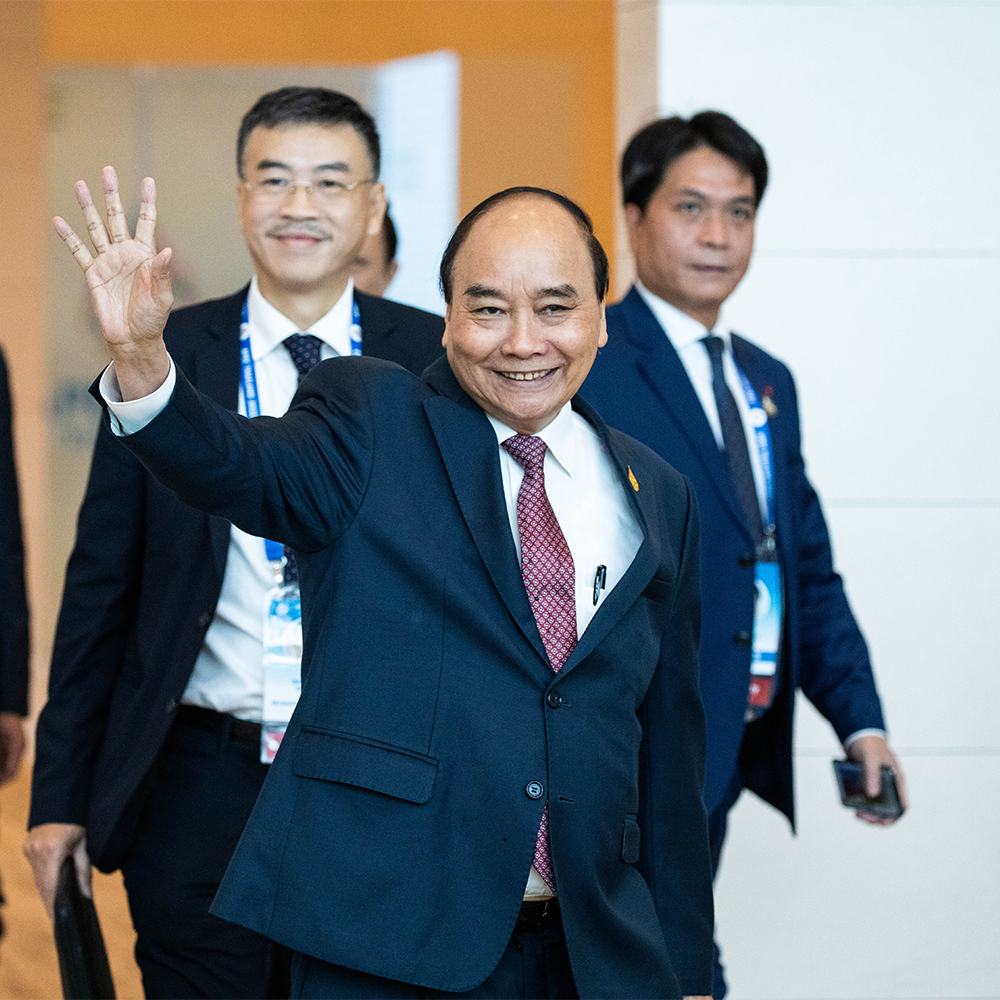The Takeaway
Vietnam’s president, Nguyen Xuan Phuc, submitted his resignation to depart from his office and retire on January 17 after the Communist Party of Vietnam (CPV) accused him of “violations and wrongdoing” of officials under his rule. Phuc is the latest casualty of the CPV’s fierce anti-corruption crusade, which has so far ousted veteran, top-ranking officials, including two deputy prime ministers.
In Brief
Vietnam’s year-long anti-corruption drive, spearheaded by the CPV’s powerful general secretary, Nguyen Phu Trong, has prompted resignations of top-ranking ministers and arrests of government officials linked to corruption scandals. Prior to Phuc’s resignation, the party fired two deputy prime ministers: Pham Binh Minh, the incumbent foreign minister, and Vu Duc Dam, who oversaw Vietnam’s response to the COVID-19 pandemic. Both ministers working under Phuc were dismissed in early January 2023 over corruption charges related to repatriation flights for Vietnamese nationals stranded overseas during the pandemic and bribery surrounding the procurement of overpriced COVID-19 test kits that were falsely marketed as “WHO-certified” and “locally-made.” According to state media, Phuc took responsibility for the misdeeds and transgressions of his subordinates, leading to his abrupt departure. Vietnam’s National Assembly has approved his resignation, but his successor is yet to be named. In the interim, Vice President Vo Thi Anh Xuan will fill the role, becoming the first woman to hold the position.
Implications
Although a ceremonial head, Phuc held an important decision-making role within the party and the country, which is ruled through four main positions: the secretary general of the CPV, the president, the prime minister, and the chair of the parliament. By escalating the anti-corruption drive — and showing that even high-ranking roles are not beyond reproach — the CPV has demonstrated its “tough” stance on thwarting corruption. The CPV’s sudden dismissal of Phuc is unprecedented, a departure from its typically cautious way of dealing with political restructuring. Some observers have linked Phuc’s exit to political infighting, with political rivals eyeing to eliminate Phuc from the race to secure the highest role in the CPV: general secretary. But it’s unclear what unintended consequences could result from the high-profile purges, which could impact the structure of the CPV, political stability, and the economy at large.

During his time as prime minister from 2016-21, Phuc was a pro-business leader who unleashed reforms that pushed Vietnam’s GDP to an average growth rate of six per cent annually, in the process becoming one of the fastest-growing economies in the region. Phuc is also credited for his liberalized trade policy, which saw Vietnam join the Comprehensive and Progressive Agreement for Trans-Pacific Partnership (CPTPP) and strike a free trade agreement with the European Union. The impact of Phuc’s resignation on investor sentiment is not yet clear, but some experts have stated that the purge could lead to instability, shaking up investor confidence in Vietnam. Vietnam’s political and economic future will largely depend on the CPV’s next steps as well as appointments to key party positions in the coming weeks.
What's Next
- Successor to the top job
Incumbent party head Nguyen Phu Trọng is slated to complete his third term in 2026 and is ineligible for re-election due to term limits imposed by the CPV’s constitution. Phuc's successor is likely to be To Lam, the incumbent Minister of Public Security, a close ally of Trong who has enforced the country's various anti-corruption probes since 2016. These purges may be early manoeuvres to remove potential opponents to Tam’s accession. If Lam is appointed to fill Xuan’s interim role as president, it’ll be a clear signal that he will, ultimately, hold the top job.
- Foreign policy direction
In early January 2023, Vietnam’s National Assembly appointed two new deputy prime ministers to complete the remainder of the 2021-26 term: Tran Hong Ha, Minister of Natural Resources and Environment, and Tran Luu Quang, secretary of the Party Committee of northern Hai Phong City. Unlike their predecessors, who were experts at managing Vietnam’s relations with China and the U.S., the two new deputies have scant foreign affairs experience, casting doubt on Vietnam’s ability to navigate geopolitical tensions between the two titans.
• Produced by CAST’s Southeast Asia team: Stephanie Lee (Program Manager); Alberto Iskandar (Analyst); Saima Islam (Analyst); and Tim Siao (Analyst).
